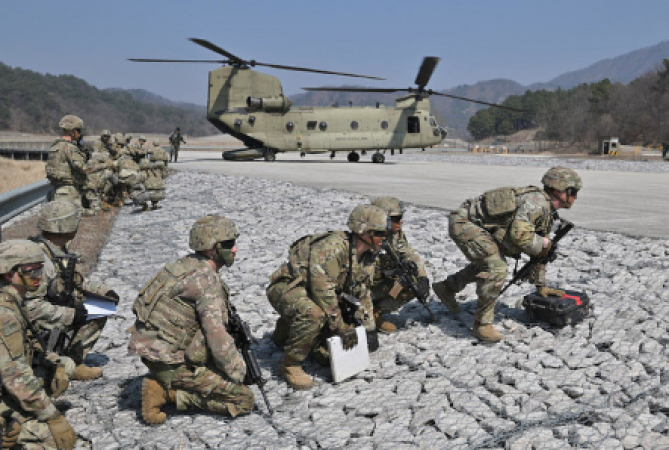
Seoul: Despite the North's warning that it won't put up with what it calls such a hostile invasion rehearsal on its doorstep, the South Korean and US militaries were scheduled to start extensive live-fire drills close to the North Korean border on Thursday.
First of the five firing drills the allies will conduct until mid-June, this Thursday's drills mark 70 years since Seoul and Washington first formed their military alliance. Such significant South Korean-US exercises have typically been met by missile and other weapon tests from North Korea.
North Korea has tested more than 100 missiles since the beginning of 2022, but none since it launched an intercontinental ballistic missile with solid fuel in mid-April.
Also Read: 2-year prison term for the long-running casino strike led by the Cambodian union leader
North Korea claims its rapid pace of tests was intended to counter the increased military exercises between the US and South Korea, but observers believe the North is actually advancing its weaponry in order to extract more concessions from its rivals through diplomacy.
The joint firing drills between the US and South Korea, also known as "the combined annihilation firepower drills," would be the largest of their kind. Since they first started in 1977, the drills have been conducted 11 times, according to the South Korean Defence Ministry.
According to ministry officials, this year's drills will include multiple rocket launchers, attack helicopters, tanks, and advanced stealth fighter jets from South Korea and the United States. The number of troops participating in the drills was not immediately known, but the most recent drills held in 2017 brought together about 2,000 soldiers and 250 weapons from the two nations.
Also Read: Norway claims it will assist in training Ukrainian pilots to fly F-16s
The drills, according to a previous Defence Ministry statement, are intended to improve the capabilities of the allies' combined operational performance. It was stated that South Korea and the US would work to develop "the overwhelming deterrence and response capabilities" to counter North Korean nuclear and missile threats.
The exercises were described as "a typical North Korea-targeted war rehearsal" by North Korea's state media on Friday. North Korea "cannot but take a more serious note of the fact that" the exercises would be held just a few miles (kilometres) from its border, it was stated in the statement.
The US and South Korea will face undefined "corresponding responses" for their string of extensive, provocative drills, according to KCNA.
The South Korean and US militaries recently engaged in their largest field training exercises in the previous five years. For joint exercises with South Korea, the US also sent the nuclear-powered USS Nimitz aircraft carrier and nuclear-capable bombers.
In order to further its stated objective of modernising its arsenals of weapons, Moon Seong Mook, an analyst for the Seoul-based Korea Research Institute for National Strategy, suggested that North Korea could use the drills between South Korea and the US as a pretext to resume testing. He claimed that domestic concerns like North Korea's efforts to increase agricultural output during the rice-planting season could still have an impact on its choice to conduct weapons tests.
North Korea "can't help but feel some burdens" over the joint US-South Korean firepower exercises, which are being conducted in a robust manner for the first time in six years, according to Moon. ICBMs with solid propellants, ballistic missiles launched from submarines, or short-range ballistic weapons could all be tested by North Korea, according to him.
US President Joe Biden and South Korean President Yoon Suk Yeol announced measures to strengthen their deterrence capabilities during their summit last month, including the regular docking of US nuclear-armed submarines in South Korea, stepping up joint training exercises, and creating a new nuclear consultative group.
Additionally, Biden sternly warned that any nuclear strike by North Korea against the US or its allies would "result in the end of whatever regime" was responsible.
Later, Kim Yo Jong, the influential sister of North Korean leader Kim Jong Un, claimed that the Biden-Yoon summit deal revealed the two nations' "most hostile and aggressive will of action" against the North.
She vowed to support her nation's expanding nuclear doctrine, stating that "the pipe dream of the US and South Korea will henceforth be faced with the entity of more powerful strength."
Concerns about North Korea's nuclear programme increased after the North last year passed a law authorising the use of nuclear weapons as a first resort. According to many foreign experts, North Korea still lacks operational nuclear missiles.